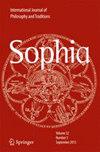1910 年代俄罗斯姓名--荣耀之争中的 "帕拉米主义 "和 "巴拉米主义":哲学背景
IF 0.5
3区 哲学
0 PHILOSOPHY
引用次数: 0
摘要
关于 "帕拉米主义 "和 "巴拉米主义 "在 19 世纪末至 20 世纪初俄罗斯思想界的哲学地位,我发现了两种解释思路。其中一条线将帕拉米主义与亚里士多德主义和唯名论联系起来,将巴拉拉姆主义与柏拉图主义和现实主义联系起来。另一条线则反过来将帕拉米主义与柏拉图主义、巴拉拉姆主义与唯名论联系起来。在 1910 年代的 "唯名论 "争论中,我详细追溯了这两条路线的发展和转变。我展示了当时拜占庭学术研究对神学辩论进程的影响。本文章由计算机程序翻译,如有差异,请以英文原文为准。
“Palamism” and “Barlaamism” in the Russian Name-Glorifiers Controversy of the 1910s: The Philosophical Background
I find two lines of interpretation of the philosophical status of “Palamism” and “Barlaamism” in the Russian thought of the late 19th to early twentieth centuries. One of these lines links Palamism with Aristotelianism and nominalism, and Barlaamism with Platonism and realism. The other line, conversely, connects Palamism with Platonism and Barlaamism with nominalism. I trace in detail the development and transformation of these lines in the course of the Name-Glorifiers controversy of the 1910s. I show the impact of the academic Byzantine studies of that time on the course of the theological debate.
求助全文
通过发布文献求助,成功后即可免费获取论文全文。
去求助
来源期刊

Sophia
PHILOSOPHY-
CiteScore
0.60
自引率
0.00%
发文量
44
期刊介绍:
Sophia is now published by Springer. The back files, all the way to Volume 1:1, are available via SpringerLink! Covers both analytic and continental philosophy of religionConsiders both western and non-western perspectives, including Asian and indigenousIncludes specialist contributions, e.g. on feminist and postcolonial philosophy of religionSince its inception in 1962, Sophia has been devoted to providing a forum for discussions in philosophy and religion, focusing on the interstices between metaphysics and theological thinking. The discussions take cognizance of the wider ambience of the sciences (''natural'' philosophy and human/social sciences), ethical and moral concerns in the public sphere, critical feminist theology and cross-cultural perspectives. Sophia''s cross-cultural and cross-frontier approach is reflected not only in the international composition of its editorial board, but also in its consideration of analytic, continental, Asian and indigenous responses to issues and developments in the field of philosophy of religion.
 求助内容:
求助内容: 应助结果提醒方式:
应助结果提醒方式:


